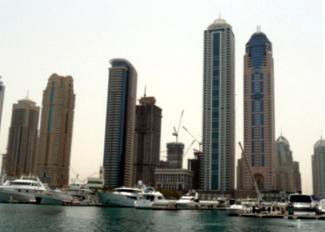Readers' trip "hospitality inside Dubai" also analysed human resources
Dubai (May 30, 2008). In terms of standard of living and costs, Dubai is adjusting to the level of international metropolises step by step. Even hotel employees are confronted with rising rents and cost of living. But their wages have been stagnating for years. 99 percent of the labour market in Dubai are "expatriate"-driven, i.e. the city depends on the influx of foreign employees - more than ever facing the enormous expansion (the photo shows a small piece of the towers at Dubai Marina, the new business district). That is why regional decision makers in human resources are increasingly being brought down to earth. Anna-Maria Dreesen, who has been responsible for human resources at Kempinski Hotels in the Middle East until recently, and Ulrich Wilhelm, human resources consultant and recruitment expert von Konen-Lorenzen, explained the current situation in the field of human resources to the participants of the 1st "hospitality inside Dubai" readers' trip in early May. Read also what Ulrich Wilhelm has to say who is Head of the Arabian regional office in Ajman of Konen-Lorenzen, a German human resources consultancy and recruitment company.

Mr. Wilhelm, since when have wages been stagnating in the hotel industry, and at what level (job examples)?
Ulrich Wilhelm: In our talks with internationally experienced executives and senior managers, we have repeatedly noticed that wages for leadership positions have only changed marginally over the past eight to ten years on the local market. Managers, who have been working for several years in the Middle East and now think about returning, are usually surprised that today's wages are almost the same as at the time of their former stay in the region.
In what way does the lack of employees drive up wages and/or benefits? What can companies do to keep their employees?

Ulrich Wilhelm at the
Burj Al Arab. photos: map
Wilhelm: For some months, new hotel companies have been entering the market offering both wages that are 20 to 30% higher and better benefits. In most cases, these are hotels (still) lacking a strong brand image trying to cover their need for personnel by paying higher wages. In our opinion, staff contentment is the decisive factor in keeping employees. Here, apart from an open and positive company culture, internal further education and development programmes are on top of the list. However, many companies still lack action in this field despite all sorts of talk about it.
What benefits are usually included in wages in Dubai?
Wilhelm: Besides the basic wage, the packages usually include the following benefits: partial moving costs, accommodation (either an apartment is provided or a housing allowance is paid), health insurance and annual flights home (also for the family depending on the position), transport cost allowance, contributions for tuition fees, bonus regulations. Some employers offer a life insurance and a pension regulation as well as the possibility to acquire shares.
Do companies pay a currency adjustment in view of the high inflation rate of 10% officially and 25% inofficially?
Wilhelm: Not in the hotel industry as a rule.
How high is fluctuation in Dubai, and how high is it in the other Emirates and Arabian states?
Wilhelm: There are no reliable figures concerning total fluctuation, as we're solely active in the field of top management.
What kind of industries are trying to entice away employees and under what conditions?
Wilhelm: For many years, we have been noticing that employees are increasingly enticed away from other industries in the areas of marketing and PR. Conditions in the hotel industry are still not competitive compared to other industries, and qualified hotel employees in this field are in high demand particularly in other services companies. Employees from our industry are used to irregular working hours and overtime, they are flexible, service-oriented and have a positive appearance and good social behaviour for the most part. Wages are often up to 100% above wages in the hotel industry.
What is the level of training of Arabian employees, and what kind of jobs do people from the Emirates accept?
Wilhelm: The necessity and willingness to get qualifications is often lower compared to employees of different origins according to our experience. But we notice a growing number of people from here, who are very ambitious and seek further education on a regular basis. They prefer jobs connected to a high degree of prestige and reputation. Jobs having to do with preparing or serving alcohol and pork are taboo.
What fields record the greatest lack of employees in the hotel industry?
Wilhelm: It is hard to say as we are focused on the management level. But in our talks with human resources managers, we have learned that in the lower levels of management, the air is getting thin in terms of mass recruitments.
How do hotels in Dubai want to attract employees in the future? And, above all, will the required numbers of employees be available?
Wilhelm: There are various different plans with respect to master this enormous challenge in the future; e.g. tapping new markets for mass recruitment or adjusting requirements. However, nobody has been able to present us with a logical and feasible strategy in our talks. Apart from this, the loss of service quality is becoming ever more obvious in Dubai which is another problem resulting from the enormous need for employees and a problem not to be underestimated.
To print this article you have to be registered and logged in for newsletter, visitor or subscription.





